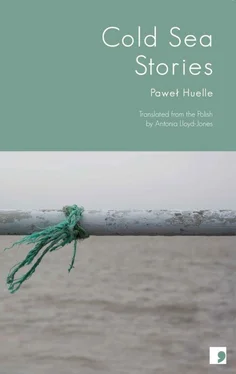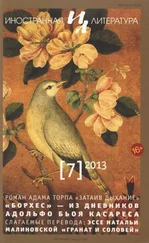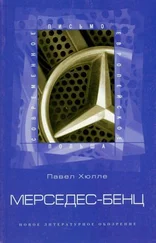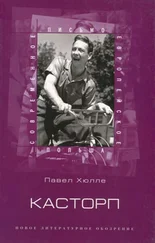He lit a bonfire, told the dog to keep watch, and headed downhill to the seashore, which on this side of the island was almost flat, grassy and swampy like a peat bog. He attached a stone to a mesh net and cast it far into the sea, carefully fastening the line on shore. Halfway back he met Harald. The dog cringed at his feet with his tail between his legs, blocking the path, and when Bjorn tried to move ahead, he began to bark.
‘Has our stag come back?’ said Bjorn. ‘All right, all right, I know that’s no morsel for us! For meat like that you go to the rope! Stop barking!’
The words stuck in his throat. By the bonfire sat a man, the one who had disembarked from the sloop at the foot of the cliffs. Bjorn could not take another step. He was sure that when the stranger turned his face from the fire, he would die, for no one can look death in the eyes twice; but what happened was different. He did turn to face Bjorn, but Bjorn did not die. The face was the one he remembered from before the night in the forge.
‘Do not be surprised,’ said the same, deep voice. ‘Do not be afraid. It is I who need your help.’
‘First I want to know,’ said Bjorn, barely advancing a step, ‘who you are. If you won’t say, I will leave. What I saw then…’
‘Was not for you. Each man may see only as much as he is destined.’
‘So first I must know what I am destined.’
Having said this, Bjorn was surprised by his own boldness. He no longer called him ‘Sir’, he had raised his voice, and yet this man, if he was a man, was capable of far more than a hundred squires from Ventlinge; if he was not a man, things could take an even worse turn.
‘Believe me, it is better not to know. He who knows the future suffers doubly, and sometimes four times over. You do not deserve that.’
‘Your speech is not clear,’ said Bjorn, approaching the bonfire, ‘so who are you?’
‘One of the three, though not the first or the last.’
‘You do not wish to say much. Where do you come from?’
‘We wandered from a far distant country. It is the land of the wise men, so they say. And our return was foretold at the right time. But,’ he said, looking hard at Bjorn, ‘you cannot always return to a city by the same gate.’
‘Do you live in Kalmar? Can’t you get back there? No, you must be from far away. Somewhere much further than Kalmar,’ said Bjorn, and paused for a moment. ‘Are you from Venice?’
‘I was there very long ago. But Venice is not the land of the wise men.’
Only now did Bjorn approach the fire. Slowly he sat down opposite the stranger. He was hungry, so he broke some bread and handed it to his guest. The man took a wineskin from his bag and two silver cups. Bjorn savoured the drink very slowly.
‘Have you never drunk wine before?’ asked the stranger.
‘Never,’ replied Bjorn. ‘Sometimes, after the harvest, I have tasted beer. This,’ he raised his cup, ‘is better than beer.’
The stranger smiled, and it occurred to Bjorn that anyone who ate bread and drank wine in such an ordinary way could not really be a demon, even though his speech was rather unclear. But he did know that gentlemen could be terribly eccentric, so if not for that moment in the forge, now he would no longer have been at all afraid.
‘So what does your city look like?’ he asked, as the man poured him more wine.
‘It has twelve gates. Three at each point of the compass. Before that one must cross a desert and climb a mountain.’
‘And you cannot return by either?’
‘Sometimes the gate is too tight, the road too narrow.’
‘What is the desert like?’
The stranger poured more wine in silence as he sought a definition. Finally he drew an arc in the air and replied: ‘It is almost the same as here, except that instead of moss and grass there is sand everywhere.’
‘Did you travel through so many lands to find me? And what,’ asked Bjorn, gulping, ‘what was that, there in the forge?’
‘I will explain everything. But first could you tell me a story? Your story? What you remember.’
The request amazed Bjorn. No one had ever asked him about his life. Nor had he ever confided in anyone. Occasionally he went back to the past in his dreams, but it caused him pain. He regarded his fate as closed, as if a large, invisible hand had stamped a heavy seal on it. But at the same time there was something tempting about this proposal, some inexplicable hint of hope, which prompted his first words, and then a lot of simple, shyly uttered sentences.
It was hardest of all for him to talk about Venice. He was four-and-a-half when he and his father, a painter of urban alleyways and human faces, had boarded a ship and set off for the Swedish king’s court. For several years they had done perfectly well, although his father had not gained the title of court painter. He was a Catholic and refused to change his faith. However, he had commissions and money. He told his son, soon we will have saved enough to afford the return journey and a happy life. But good fortune had turned its back on them for ever. Arrested on a charge of conspiracy and tortured, he had taken poison, which friends had provided. From them Francesco – for in those days he was not yet Bjorn – had learned that the officials had taken everything his father had put aside. He had been taken into service, first to a stable, then to a pastor. He had had to adopt their faith and take a new name. He ran away from that house, became a vagrant and ended up in prison. The pastor had bought him out, but when the plague had devastated whole villages on the island of Öland, and people were being sought to work there, he had handed the disobedient boy to the estate at Ottenby, taking compensation from the royal game warden. Bjorn had sailed to the island with some prisoners, with whom he spent almost two years putting up the King’s wall. Then, taken into service at Ventlinge, he could choose himself a house to live in. Many of them still stood empty after the plague. He chose the one on the cliff top, at the edge of Alvaret plain, situated furthest away from people and from the village. He did not have the money to be a tenant farmer or a smith. The steward needed shepherds, so he had become one. For the first few years he thought about giving it up, but he had nowhere to go back to. Later on he came to like solitude, and so a good fifteen years had gone by, if he had not made a mistake in the reckoning. The kings had changed, so had the squires of Ventlinge, and the royal game wardens at Ottenby, while each year he followed the same clouds and the same stars in the sky.
‘Sometimes,’ Bjorn concluded, ‘I dream of strange things. A year ago, when I lost the flock, I saw a city with four gates. Apparently it stood here, in the middle of Alvaret, before the people left it in long boats. Jansen heard that a thousand years ago they built a kingdom in the south and that they captured Rome. And now,’ he said, drinking up the wine, ‘I shall listen to your tale.’
What the stranger talked about was not simple, because it had no definite beginning. There was some sort of quarrel in Edessa, during which he had hoodwinked two avaricious Persians. Then there was a conversation with a Sufi in Smyrna, convoluted, too complicated; next a voyage by ship to Tagaste, with no results. Bjorn listened avidly, but understood little. His attention was riveted by a recurring word: the Book. Found, but lost forever, as if it were everywhere and nowhere all at once. He did not know if he had understood properly, but it emerged that this Book was older than the Bible, and that it contained everything that has been, is now, and has yet to be, from a grain of sand at the bottom of the sea to the boundlessness of the starry sky, from the word that was in the beginning, to the terrible riders of the very last days. Something else had been worrying Bjorn ever since he had vaguely yet adequately understood that if the stranger were telling the truth he must have witnessed events so remote in time that he could not possibly be an ordinary mortal. He had seen other great books, forgeries and copies, sometimes so perfect that his mission had seemed to be over. As he described examining these pages and symbols, time seemed to flow by in his story like an unfolding, moving image of something that never actually changed. Imperceptibly he passed into explanations: in a prophecy unknown to him before, which he had found in the scriptorium at the monastery of Notre Dame d’Aiguebelle in Provence, he had come upon a description of the island and the shepherd. He had hired a ship and headed here, to the North, where he had never set foot before.
Читать дальше












